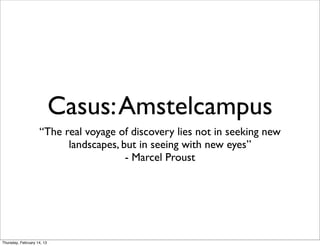
Presentatie honours deep dive amstelcampus
- 1. Casus: Amstelcampus “The real voyage of discovery lies not in seeking new landscapes, but in seeing with new eyes” - Marcel Proust Thursday, February 14, 13
- 2. Thursday, February 14, 13
- 3. The future? Thursday, February 14, 13
- 4. key principles Thursday, February 14, 13
- 5. • What can we contribute to Amstelcampus? • How can we take ownership and improve this initiative from a systemic point of view? • Why is this initiative relevant to our own projects? Thursday, February 14, 13
- 6. What is a deep dive? Sensing Journeys are a way of experiencing the system through the lens of different stakeholders. participants will: • immerse themselves in different contexts • step into relevant experiences • move into unfamiliar environments Thursday, February 14, 13
- 7. Why do a deep dive? Purpose To engage stakeholders of a system in a series of immersion, listening, inquiry, and dialogue activities that create: • a network of relationships among key stakeholders in that system • a shared understanding of the systemic forces at play • input for prototype ideas that could catalyze profound change Thursday, February 14, 13
- 8. How to do a deep dive? Define places of high potential: the whole group of participants should go to several places that can provide insights into: • the different perspectives of key stakeholders • the different aspects of that system • the ‘voiceless’: people in the system, those who usually are not heard or seen. • a good way to get a sense of the system is to look at its “extreme users”: those with special requirements, such as a person living in a remote area needing access to a health system. Thursday, February 14, 13
- 9. Deep diving principles Listening to others: to what the people you meet are offering to you • Listening to yourself: to what you feel emerging from within • Listening to the emerging whole: to what emerges from the collective and community settings that you have connected with Thursday, February 14, 13
- 10. Deep dive #1 Step 1: Preparation: Establish common ground by discussing with your group members: • What is the context you are going into? • Who are the key players that you need to talk with? • What information do we need before going there? • What are the questions are you most interested in exploring? Thursday, February 14, 13
- 11. Deep dive #2 Step 2: Preparation Start by developing a short questionnaire (7-10 questions) that guides your inquiry process. For example: - What is the need? - What are the key principles about this initiative? - Who is initiating? - For whom? - What do they value most about this initiative? - etc. Thursday, February 14, 13
- 12. Deep dive #3 Step 3: Small groups travel to the host’s location. While at the site: Trust your intuition and ask authentic questions. Asking simple and authentic questions focuses attention on some of the deeper and systemic forces at play. Rather than researching take time to listen and follow the dialogue instead of rushing to solutions. Thursday, February 14, 13
- 13. Deep dive step #3 Example of questions to ask the visit: 1.What personal experience or journey brought you here? 2.What issues or challenges are you confronted with? 3.Why do these challenges exist? 4.What are the blockages? 5.What are your most important sources of success and change? 6.What would a better system look like for you? 7.What initiative, if implemented would have the greatest impact for you? And for the system as a whole? 8.If you could change just a couple of elements what would you change? 9.Who else do we need to talk to? Thursday, February 14, 13
- 14. Deep dive step #4 Step 4 After the visit: Reflect and debrief To capture and leverage the findings of your inquiry process, conduct a disciplined debriefing process after each visit right after each visit. Don’t switch on cell phones until the debriefing is complete. Thursday, February 14, 13
- 15. Deep dive step #4 Here are a few sample questions for the debriefing: 1.What struck me most? What stood out? 2.What was most surprising or unexpected? 3.What touched me? What connected with me personally? 4.If the social field (or the living system) of the visited organization or community were a living being, what would it look and feel like? 5.If that being could talk: what would it say (to us)? 6.If that being could develop—what would it want to morph into next? 7.What is the generative source that allows this social field to develop and thrive? 8.What limiting factors prevent this field/system from developing further? 9.Moving in and out of this field, what did you notice about yourself? 10.What ideas does this experience spark for possible prototyping initiatives that you may want to take on? Thursday, February 14, 13
- 16. Deep dive step #5 Step 5 Close the feedback loop with your hosts: Send an email (or other follow-up note) expressing a key insight you took away from the meeting (one or two sentences), and your appreciation. Thursday, February 14, 13
- 17. Deep dive step #5 Step 5 Close the feedback loop with your hosts: Send an email (or other follow-up note) expressing a key insight you took away from the meeting (one or two sentences), and your appreciation. Thursday, February 14, 13
- 18. Deep dive step #6 Step 6 Debrief as a whole group. Structure of the whole group debrief meeting: 1.Get everyone on the same page by sharing concrete information about the Journeys: Where did you go, who did you talk to, what did you do? 2.Talk about your findings and generate new ideas. Thursday, February 14, 13
